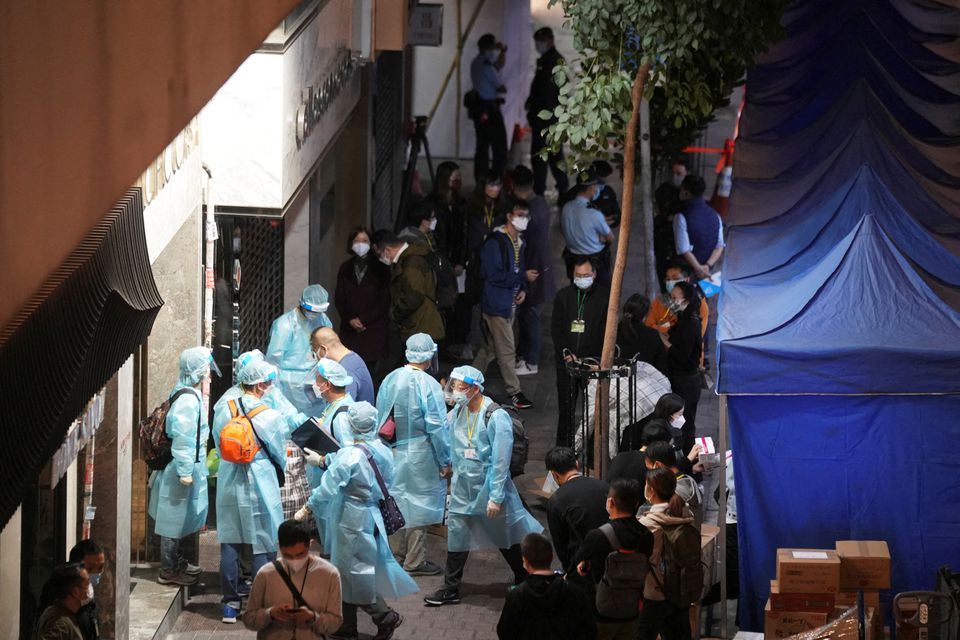Millions more locked down as China battles Omicron spread

Workers wearing protective suits arrive to a building under lockdown for compulsory testing, following the coronavirus disease (COVID-19) outbreak in Hong Kong, China January 7, 2022. | PHOTO: REUTERS/Lam Yik
BEIJING — Five million residents of a central Chinese city were confined to their homes Tuesday while another megacity shuttered all non-essential businesses, as the country battles a spate of coronavirus outbreaks including from the Omicron variant.
Beijing is on high alert as it prepares to host the Winter Olympics next month, sticking to a zero-Covid strategy of targeted lockdowns, border restrictions and lengthy quarantines.
While those measures have kept the number of new cases far lower than virus hotspots in the United States and Europe, China is currently facing local flare-ups in multiple cities.
Fast-spreading Omicron presents a fresh challenge, with two cases in Anyang — the newly locked-down city in Henan province — linked to a growing infection cluster in the northern metropolis of Tianjin, some 400 kilometers (250 miles) away.
Authorities in Anyang announced the lockdown late Monday, issuing a notice ordering residents not to leave their homes or drive cars on the roads, state news agency Xinhua reported.
Article continues after this advertisementAll non-essential businesses have been closed and a mass-testing drive has been launched “to respond to the severe epidemic control situation and strictly prevent the spread of the Omicron virus outbreak”, Xinhua reported.
Article continues after this advertisementThere were 58 new local infections reported in Anyang, state broadcaster CCTV said Tuesday, bringing the city’s total caseload to 84 since Saturday.
The city had already restricted outbound travel, which local officials said was to “ensure that the outbreak does not spill over into outside areas”.
At least three cities in Henan are battling emerging outbreaks, with provincial capital Zhengzhou’s 13 million inhabitants inching closer to a full lockdown.
Under current rules, schools and kindergartens have been closed along with all non-essential businesses.
Last week, one million people in the city of Yuzhou were put under stay-at-home orders.
Hong Kong, Shenzhen
Elsewhere, Tianjin — a major port city just 150 kilometers from Beijing — has barred people from leaving without official permission, ordered the testing of all 14 million residents, and cancelled trains into the capital.
Tianjin, which is adjacent to Winter Olympics venues in Beijing and Hebei province, confirmed another 10 new locally transmitted cases after citywide mass testing.
Zhang Boli, of the Chinese Academy of Engineering, told local television that the Tianjin cluster is the first time Omicron has been detected spreading within China.
The northern city of Xi’an is in its third week of lockdown as it attempts to stamp out a 2,000-case outbreak.
There are also flare-ups in southern China.
The Chinese territory of Hong Kong is battling its own Omicron outbreak that began with returning airline crew.
The outbreak has upended the city’s zero-Covid success and seen a reintroduction of strict social-distancing measures including the closure of bars and gyms, and an end to evening restaurant dining.
On Tuesday, chief executive Carrie Lam announced further measures including the closure of all kindergartens and primary schools until after the Lunar New Year in early February.
Her administration has hewn to China’s closed-off blueprint but is facing growing anger from both residents and international businesses over the lack of an exit strategy.
Across the border from Hong Kong, the mainland tech hub of Shenzhen has also logged a handful of cases in recent days, sparking lockdowns of some housing compounds, a mass-testing initiative and travel restrictions.
The city’s Yantian port is one of the world’s busiest, and there are fears that further lockdowns or restrictions there and in Hong Kong could compound already acute global supply problems.
RELATED STORIES
China’s Tianjin tightens control over travel after Omicron cases
China detects more Omicron cases as cities tighten restrictions
For more news about the novel coronavirus click here.
What you need to know about Coronavirus.
For more information on COVID-19, call the DOH Hotline: (02) 86517800 local 1149/1150.
The Inquirer Foundation supports our healthcare frontliners and is still accepting cash donations to be deposited at Banco de Oro (BDO) current account #007960018860 or donate through PayMaya using this link.